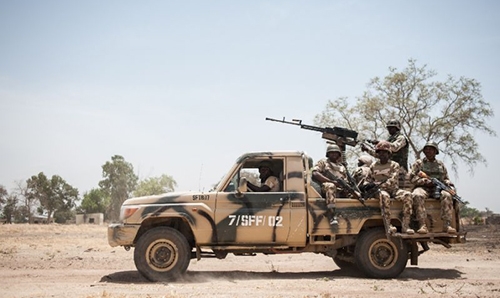Cooperate to stop rise of new Boko Haram, foreign powers told
Abuja: Foreign and regional powers were on Saturday told to do more to help countries affected by Boko Haram, with greater cooperation urged to neutralise the threat and prevent the creation of new extremists.
Delegates at the conference in Abuja were told that progress had been made since the last meeting in Paris two years ago, as the Islamists had been pushed out of territory it controlled in northeast Nigeria.
But with a worsening humanitarian crisis of more than 2.6 million people in the Lake Chad region, where Nigeria meets Cameroon, Chad and Niger, there were calls for more to be done.
"It is vital that the international community now does more. We need to continue," said French President Francois Hollande, warning it was "not time to drop our guard".
Boko Haram has been designated "the world's deadliest terrorist group" and has links to the Islamic State group, which is active in Iraq, Syria and Libya. Nigerian rebels have been reported in north Africa.
Britain's Foreign Secretary Philip Hammond told the summit: "A lasting peace can only be achieved if the countries of the region, with our support, cooperate to implement a sustainable strategy that not only wins the war but also wins the peace."
Countries hit by the violence that has killed at least 20,000 since 2009 had to win "the hearts and minds of those terrorised by Boko Haram", he said, describing the conflict as "a generational struggle against an evil that will destroy us if we do not destroy it".
"Much more besides" a military strategy and a coordinated regional force was needed, he said, adding: "We must sustain this fight until evil is defeated and good prevails."
Nigeria's President Muhammadu Buhari said the Lake Chad Basin Commission estimated some 960 million euros (just over $1 billion) was needed in the short and medium term to develop the region.
Lack of development has been seen as a key factor in radicalising impoverished young people.
US Deputy Secretary of State Anthony Blinken, who said Washington was "deeply committed" to helping the military effort and also reconstruction, also said "victory on the battlefield is not enough".
A "sustained and comprehensive approach" was needed to combat extremist ideology, reconstruct shattered communities as well as investigate multiple claims of human rights abuses against armies involved, he said.
Treating former fighters and suspects with dignity and in line with international obligations was "the right thing to do but also the smart thing to do", he added.
"These efforts can address the drivers of extremism that helped give rise to Boko Haram in the first place", he added, otherwise "Boko Haram 2.0... rises from its ashes".
Related Posts

